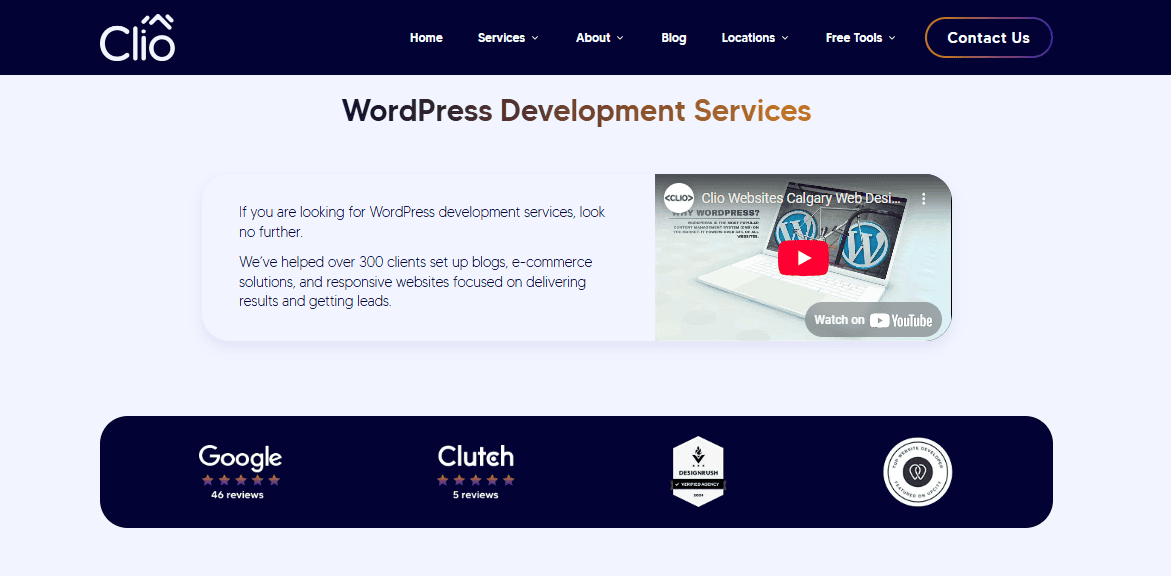Quick summary
This article explains how to choose the right website designer for your business. We cover key factors to consider like experience, custom design, SEO knowledge, and ongoing support. We also highlight why Clio Websites is a trusted choice for custom, high-performing websites. Read more actionable tips on website design and optimization on our blog.
Need help with choosing a website designer?
Choosing the right website designer can make or break your online presence. A great website does more than look good; it supports your brand, drives traffic, and converts visitors into customers. But with so many agencies and freelancers out there, it’s hard to know who’s the right fit.
That’s why we’ve created this guide. In this Clio Websites article, we’ll walk you through the key factors to consider when selecting a designer, so you can make an informed decision and invest in a website that works for your business.
But first…
Why listen to us?
At Clio Websites, we’ve been helping businesses succeed online since 2007. Based in Calgary, our team has built over 400 high-converting websites, specializing in custom WordPress development, e-commerce design, and SEO. With years of hands-on experience, we’ve seen what works and what doesn’t when it comes to website design. Our expertise ensures you’ll get the best advice on choosing a designer who can deliver results that align with your business goals.

Why choosing the right website designer matters
Your website is your digital storefront
A professional designer helps create a site that reflects your brand, builds trust, and encourages visitors to explore your services. A poorly designed site, on the other hand, can drive people away before they even learn what you do.
Design impacts performance and conversions
Good design isn’t just visual, it’s functional. A skilled designer knows how to structure content, calls-to-action, and user flows to drive conversions. Whether your goal is leads, signups, or sales, design plays a critical role in guiding user behaviour.
Mobile responsiveness is non-negotiable
Over half of all web traffic comes from mobile devices. An experienced designer ensures your site looks and works great on phones and tablets, not just desktops. If your site isn’t responsive, you’re losing visitors.
SEO starts with design
Search engine optimization (SEO) begins with a solid technical foundation. Clean code, fast loading times, mobile-friendly layouts, and intuitive navigation all start with smart design choices that impact your search rankings from day one.
A good designer is a long-term partner
Websites aren’t one-and-done. As your business grows, your site needs updates, security patches, and performance tweaks. That’s why Clio Websites offers long-term support and maintenance, to keep your site running smoothly well beyond launch.
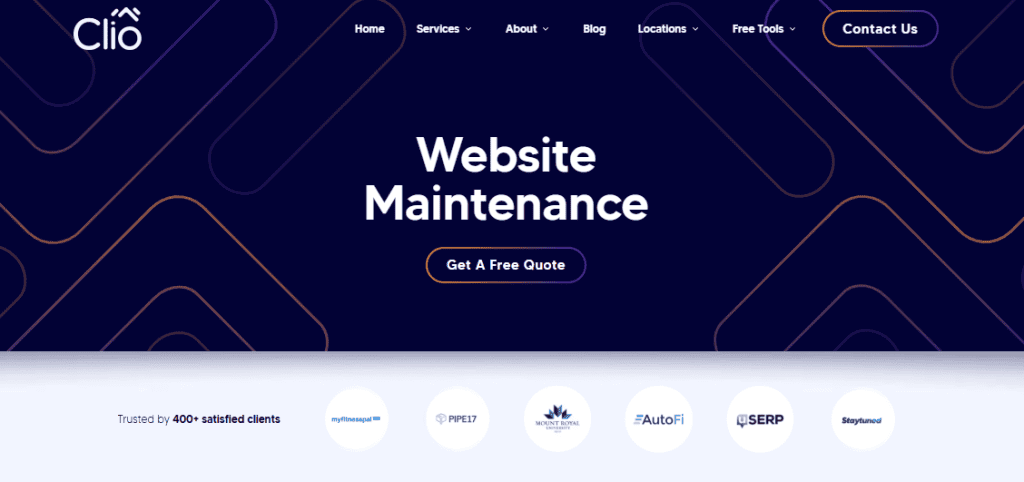
Our 4-Step Process for Choosing a Website Designer
1. Understand your needs and goals
Before you even start looking for a website designer, take time to get clear on what you need your website to do.
Identify the type of website you need
Are you launching an e-commerce store? Promoting a service-based business? Starting a personal brand or blog?
Each type of website has unique requirements. For example:
- An e-commerce store needs product pages, payment integration, and a secure checkout.
- A service business benefits from clear service pages, lead capture forms, and testimonials.
- A portfolio site might need image galleries and case studies.
Define your goals
What do you want your website to achieve? Common goals include:
- Increasing brand awareness
- Generating qualified leads
- Driving online sales
- Building authority in your industry
Clear goals help your designer focus on what matters most, whether that’s conversions, content strategy, or fast-loading pages.
Consider your audience and functionality
Think about who will visit your website and what experience they expect. A local Calgary medical clinic, for example, may need:
- Mobile-first design (for users searching on the go)
- Clear contact info and appointment booking
- SEO optimized pages to rank locally
If you’re targeting a national B2B audience, your needs will be different, perhaps gated content, blog integration, or CRM compatibility.
2. Look for relevant experience and expertise
The right website designer should have a proven track record that aligns with your goals. Here’s how to assess their experience and expertise:
Check their portfolio
A designer’s portfolio is the best indicator of their skills. Look for projects similar to yours. For example, if you’re a SaaS company, ensure their portfolio includes SaaS websites with complex features like subscription management and member login areas. A good portfolio should reflect versatility and quality, showing that the designer can handle your specific needs.
Assess their industry expertise
Experience in your industry can be crucial for success. If the designer has worked with companies in your field; be it medical, e-commerce, or oil and gas, they’ll understand the unique challenges and opportunities. This industry knowledge helps in making informed decisions and ensures your site meets all sector-specific requirements.
For instance, at Clio Websites, we are experts in industries like medical healthcare and SaaS, where functionality, security, and scalability are paramount.
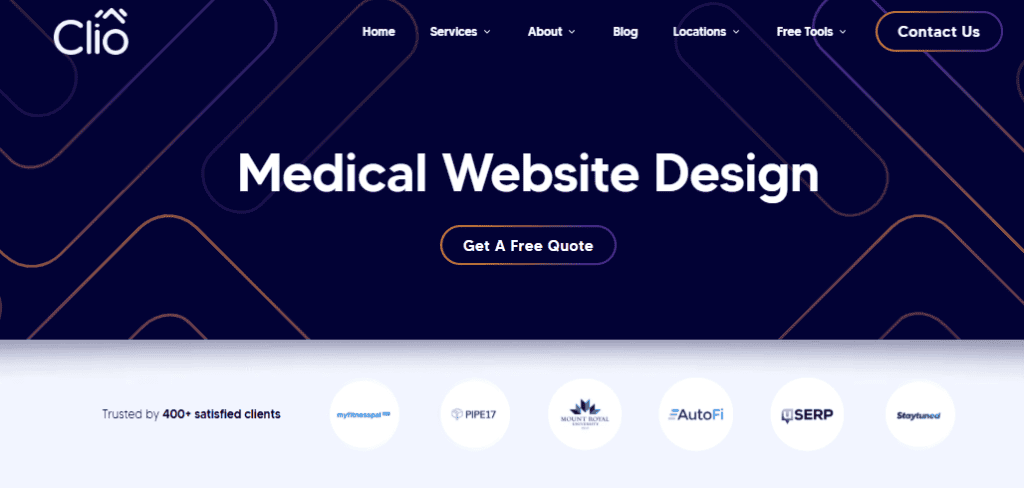
Evaluate their technical skills
It’s not just about aesthetics. A great website should also be technically sound. Ask about their proficiency in:
- WordPress development: The backbone of many modern websites. A solid understanding ensures easy updates and scalability.
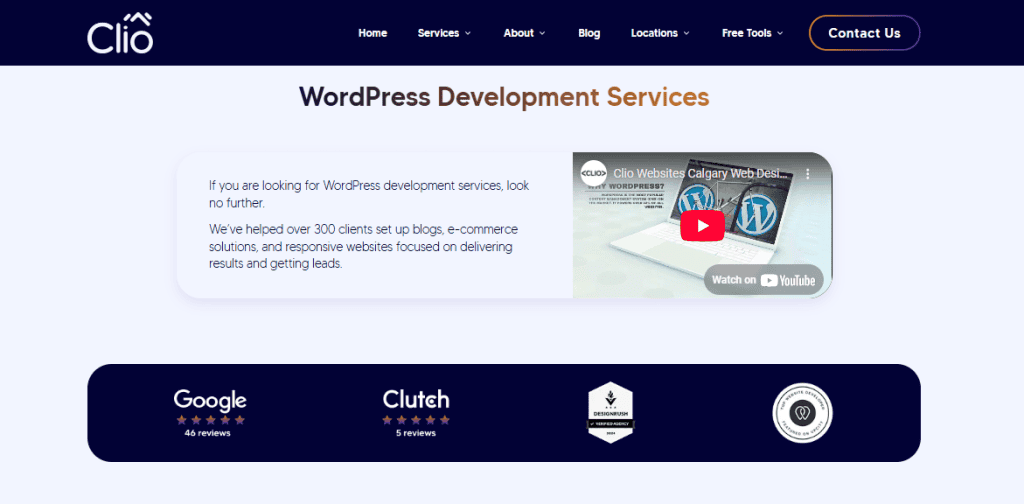
- Technical SEO: A well-optimized website can improve search engine rankings and user experience. Inquire about their approach to technical SEO, such as optimizing site architecture, improving site speed, etc.
- Custom coding: Some projects need custom solutions. Ensure the designer is comfortable with coding when needed.
3. Evaluate the designer’s process
When choosing a website designer, it’s crucial to understand how they manage projects from start to finish. Here’s what to look for:
How do they approach projects?
A solid designer will have a clear and structured process. This typically includes stages like:
- Discovery: They should work closely with you to understand your goals, target audience, and technical requirements.
- Design: Creating wireframes and prototypes that align with your brand and business objectives.
- Development: Bringing the designs to life and ensuring they function smoothly.
- Testing: Checking that the website works well across all devices and browsers.
At Clio Websites, for instance, we follow a similar process to ensure every project meets client expectations, starting with thorough discovery to ensure we’re aligned on goals, and ending with rigorous testing to guarantee quality delivery.
What is their timeline for delivery?
Timeliness matters. Ask for an estimated timeline and how long each phase of the project will take. A reliable designer will provide clear expectations, including milestones for deliverables. Ensure the timeline works for your business goals and make sure the designer is realistic about what can be accomplished within your timeframe.
Is the designer easy to communicate with?
Effective communication is key to a successful partnership. Check if the designer is responsive and willing to listen to your feedback. Are they easy to reach, and do they explain things in a way that’s understandable? A designer who values your input will ensure a smoother workflow and a final product that meets your needs.
Do they offer ongoing maintenance and support?
Websites require regular care to stay secure and up to date. Check if the designer offers ongoing website maintenance, which might include content updates, plugin management, and performance monitoring. This can save you time and ensure your site stays reliable over the long run.
4. Consider the budget and value
Choosing a website designer isn’t just about finding the cheapest option, it’s about getting the best value for your investment.
Website designers typically offer one of the following models:
- Hourly rates: Good for small updates, but can get costly if the project scope grows.
- Fixed packages: Ideal for businesses with clear requirements and limited budgets.
- Custom quotes: Best suited for complex or large-scale projects.
For example, Clio Websites offers three flexible packages:

- Growth plan at $3,000 for smaller sites (up to five pages),
- Accelerate at $5,000 for up to 20 pages with e-commerce functionality, and
- Ultimate, starting at $15K+ for custom, enterprise-level solutions including SEO and complex integrations.
These plans give businesses at different stages a clear sense of what they’re paying for and the outcomes they can expect.
Also, organizations can use our website pricing calculator tool to estimate the cost of their project based on specific needs.
Let Clio Websites help you build a site that drives results
In this guide, we covered the key factors to consider when hiring a web designer and why a custom, well-built site is essential for growing your business online. From checking portfolios to asking the right questions, making an informed choice helps you avoid costly mistakes and get the results you need.
Clio Websites offers custom web design, WordPress development, SEO, eCommerce, and maintenance services tailored to your business. Our focus is on building websites that are fast, user-friendly, and built to convert.
Ready to get started? Contact Clio Websites today and let’s build a website that works for you.
